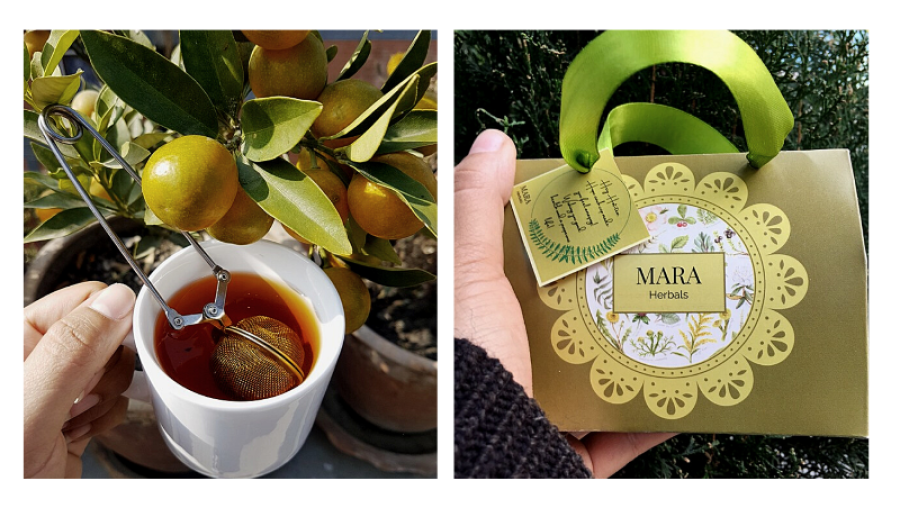Culture & Lifestyle
The rising popularity of herbal tea
Not long after the pandemic hit, many new companies cropped up and old companies remodelled themselves to meet the demand for a piping hot, niche commodity—herbal tea.
Tsering Ngodup Lama
Every morning around 8 am, a mild citrusy scent floats in Lhakpa Sherpa’s small kitchen. On the stove is a pot of boiling water and swimming furiously in it are strands of lemongrass, tulsi, giloy, and roasted green tea leaves, which have long lost their curl in the heat.
“The herbs in the tea are said to be good for the body and in strengthening immunity. And from the early days of the pandemic, it had become known that having a strong immune system aids in fighting Covid-19 infection,” said Sherpa. “It has been months that we have been drinking herbal tea every morning. Many families I know have been doing the same.”
It has been almost a year since Shital Shrestha and her family have been drinking herbal tea every evening. “Everyone in my office has been drinking herbal tea since the pandemic gripped us,” said Shrestha, a public health officer at the District Public Health Office, in Lalitpur.
In a country like Nepal, where drinking tea and the practice of using herbs to treat common ailments are so deeply rooted in the culture, the strong emphasis on maintaining one’s health and strengthening immunity due to the pandemic seems to have laid the foundation for herbal tea’s popularity in Nepal.
It was this strong demand for herbal tea that led the founders of Nepal Herbs Store, a two-year-old company that makes herbal incense and deals in medicinal herbs, plants and spices, to venture into the herbal tea business.
“The company was founded by four of us, and all of us come from different parts of the country—one from the mountain region, one from the Terai region, one from the hilly region, and one from Kathmandu,” said Robin Lama Theeng, one of the co-founders of the company. “All of us source herbs from farmers from our respective regions. When the pandemic spread in Nepal, we saw an immense opportunity in herbal teas and started collaborating with ayurvedic doctors.”
In May 2020, the company officially entered the herbal tea business with more than a dozen different types of herbal teas. Prices for the teas range from Rs 145 to Rs 275.
Last year when tea lover Monalisha Maharjan met a herbal enthusiast, the meeting, says Maharjan, planted the idea of starting her own herbal tea brand.
After researching various herbs and teas, Maharjan launched Mara Herbals in November last year.
“Before I launched the brand, I sent out a lot of samples to my friends and family and gathered their feedback and fine-tuned my product accordingly,” said Maharjan. “When I was confident enough, I launched the brand.”
Mara Herbals’ most popular products, says Maharjan, are it’s 7 Herb Immunity Tea, which costs Rs 300 for a packet of 100 grams, and chamomile tea, which costs Rs 300 for a packet of 85 grams. “Our customers seem to prefer the immunity tea for its multiple health benefits and the chamomile tea for its ability to aid in reducing anxiety and insomnia,” said Maharjan.
Similarly, of the more than a dozen different types of teas Nepal Herbs Store offers, Theeng says the most popular are Herbal Tea for Immunity, priced at Rs 275 for a packet of 100 grams, and Guduchi Herbal Tea, priced at Rs 245 for a packet of 100 grams, both of which are multi-herbs tea.
“Our Herbal Tea for Immunity has seven herbs (tulsi, giloy, ginger, cinnamon, brahmi, ashwagandha, liquorice) which are known to develop the body’s immune system and strengthen the respiratory and nervous system,” said Theeng. “Our Guduchi Herbal Tea has four herbs—giloy, liquorice, cardamom and lemongrass—and it helps build the body’s immune system and strengthens the digestive system.”
When Nepal Herbs Store first launched its teas in May last year, Theeng says the company was selling around five packets a day.
“But business has since picked up. We are now selling an average of 30 packets a day. Unlike regular teas in the market, quality herbal teas are much more expensive, so it’s a very niche market that we are in,” said Theeng.
Mara Herbals, says Maharjan, sells anywhere between one to 10 packets a day. “Our clientele is made up of people who are aware of the benefits of herbs and do not mind spending the extra money for quality and fine tea-drinking experience,” said Maharjan.
The pandemic, says both Theeng and Maharjan, have been a boon for those who want to get into the herbal tea market.
“Before the pandemic, the go-to tea among health-conscious people was green tea. For the rest, tea meant black tea. But the pandemic has introduced people to the world of herbal teas and made them aware of the many health benefits of such teas,” said Theeng. “It is important that the old and new domestic players in the herbal tea market now focus on providing quality products to the customers to earn and maintain the trust in local herbal tea brands.”
And the most important thing, says Maharjan, in doing that is ensuring quality herbs.
“We source our herbs from herb and tea processing companies, which source quality herbs from all over Nepal,” said Maharjan.
Nepal Herbs Store, says Theeng, sources the herbs they use directly from farmers.
“We do the processing, cleaning and storing of the herbs ourselves to ensure quality. We have in-house ayurveda experts to take care of product research and development,” said Theeng. “Having ayurvedic experts is crucial, as excessive consumption of some herbs can have negative effects. For example, excessive consumption of guduchi can significantly reduce blood pressure, which could lead to problems for people with low blood pressure. That’s just one of the many reasons why herbal tea manufacturers have to have ayurveda experts.”
During the early days of the pandemic, Sherpa says the market had a very limited option of branded ready-to-drink herbal teas.
“There were a few international and ever fewer local brands,” said Sherpa. “But things have changed. There are many more options for customers from both international and local brands. I have been using local brands for several months, and I am quite happy with what I am getting. Even though herbal teas are slightly more expensive, the health benefits of drinking one in the midst of a pandemic supersede the price factor.”




 9.83°C Kathmandu
9.83°C Kathmandu

.jpg&w=200&height=120)













